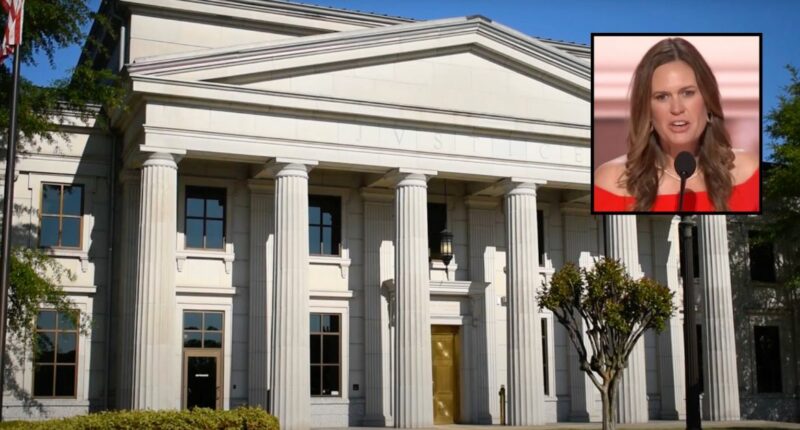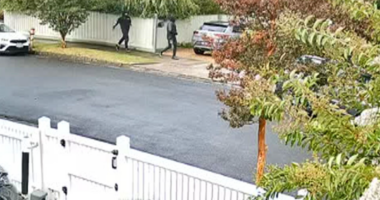Share this @internewscast.com
Background: The Arkansas Justice Building, the home of the state supreme court, in Little Rock, Arkansas (Arkansas Judiciary). Inset: Arkansas Gov. Sarah Huckabee Sanders speaks during the Republican National Convention in July 2024 (PBS NewsHour/YouTube).
The Arkansas Supreme Court has rebuffed Governor Sarah Huckabee Sanders’ plea to suspend lower court mandates, which call for the acceleration of special election dates to uphold citizens’ rights. This decision represents another in a series of legal setbacks for Sanders, who has faced several unfavorable rulings recently. Although the state’s highest court did not elaborate on their decision, the lower court judges emphasized that these cases hinge on the “constitutional right” to representation.
The issue arose following the death of state Senator Gary Stubblefield, who served Arkansas’ District 26, in September. Governor Sanders had set a special election for June 9, 2026, to fill the vacant seat. However, Sixth Judicial Circuit Judge Patricia James deemed this date inappropriate as it exceeds the 150-day period specified by state law and would occur after the state’s 2026 fiscal session, which spans from April to May.
Judge James expressed concern that scheduling the special election for June 2026 would leave District 26 residents without representation during the entire 2026 Fiscal Session of the General Assembly. In her ruling dated October 22, she stated, “The citizens of Senate District 26 would be unconstitutionally impaired if this were to occur,” warning of significant consequences if the governor’s timeline were permitted.
Further complicating matters, Judge Shawn Johnson of the same judicial circuit ruled similarly in another case involving state Representative Carlton Wing, who resigned in September to lead Arkansas PBS. The Arkansas Advocate reported that Judge Johnson ordered the special election for House District 70 to be moved up to March 3, 2026, refuting Sanders’ argument that she had unfettered authority to set special election dates.
These judicial decisions underscore the importance of timely representation and the courts’ role in ensuring that citizens’ constitutional rights are protected. The rulings highlight the judiciary’s commitment to maintaining the integrity of democratic processes, reinforcing the principle that elected representation should not be unduly delayed.
In a similar case, fellow Sixth Judicial Circuit Judge Shawn Johnson found that a special election held on June 9, 2026, was too late to replace state Rep. Carlton Wing, who resigned in September to become the CEO of Arkansas PBS, the Arkansas Advocate reported. House District 70’s special election must be moved to March 3, 2026, the judge ordered, dismissing arguments from Sanders that she had complete discretion over choosing special election dates.
Sanders and her administration made similar arguments in the state Senate District 26 case, and while James said she “agrees that the Governor has the sole ability to set dates for a special election, that authority is not absolute.”
The state supreme court ultimately rejected a motion from state Attorney General Tim Griffin’s office to consolidate the two cases and denied a stay.
Sam Dubke, Sanders’ director of communications, suggested to Law&Crime that the governor will appeal the ruling. “Governor Sanders is confident that on appeal, the law clearly giving the Governor the authority to set special elections will be upheld and ultimately save taxpayer dollars and ensure the election is free, fair, and secure.”
A spokesperson for Griffin told the Arkansas Advocate that they were “disappointed by the rulings and will continue to vigorously defend the Governor and Secretary of State.”
James handed Sanders a separate defeat in recent days. The Pulaski County judge maintained that the governor’s attempt to transfer control over the Arkansas prison system from the state Board of Corrections to herself was “unconstitutional.” Following the ruling, a spokesman for Sanders declared that they would appeal that decision to the Arkansas Supreme Court, too.















